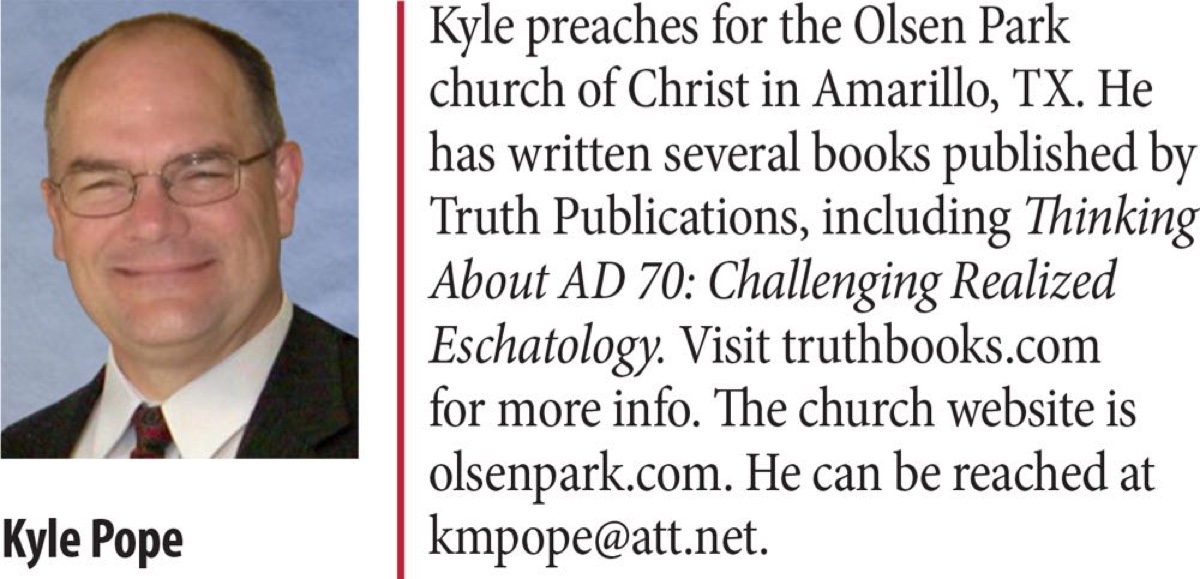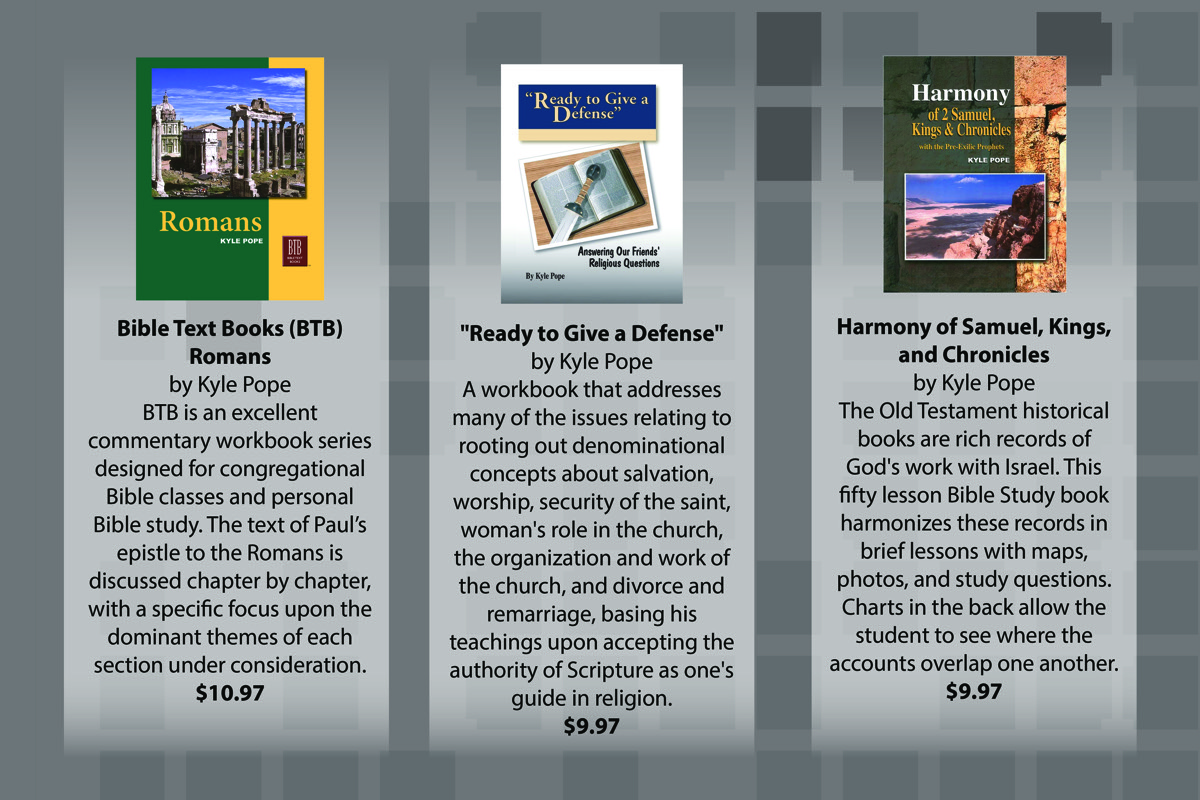By Kyle Pope
Synopsis: Consider the biblical significance of the preposition “without,” which signifies “in the absence of” (something) or “in circumstances in which the action mentioned (in the context) does not happen.”
What is there in your life that you could not live without? Sometimes we describe things we really love as things we couldn’t live without (e.g., chocolate, a mate, a hobby, our favorite entertainment). When it comes to our physical lives, there are really only a few things that we cannot live without—things like food, water, clothing, and shelter. These are indispensable to life since we cannot dispense with them and survive. What are some spiritual indispensables? Let’s consider seven things the Bible describes in this way.
The blood of animals (like bulls, goats, and lambs) that were used in Old Testament sacrifices had value, but the Hebrew writer makes it clear that their value was limited (Heb. 10:1-4). The Blood of the new covenant is not that of animals but of Christ Himself, our High Priest and Savior (Heb. 9:11-15). Redemption from sin comes through Christ’s blood shed on the cross (Col. 1:13-16). Unlike the limited nature and power of animal sacrifices, Christ’s blood offers redemption and forgiveness because of its source. Jesus is and was “the image of the invisible God.” The blood of God in the flesh can bring Divine forgiveness!
How does one access this blood? Paul taught that one is baptized into Christ’s death (Rom. 6:1-4). When a person is baptized into Christ, he is baptized into Christ’s death, gaining access to this redeeming blood.
What is the benefit of this blood? Christ’s blood cleanses us (1 John 1:5-7). Truly, without blood—His blood, there is no forgiveness of sins. If we are outside of Christ and have never been cleansed by His blood, the stain and filth of sin clings to us to this very moment. Christ’s blood is a spiritual indispensable.
All who die outside of Christ die in sins (John 8:21-24). Just as the one without the blood of Christ retains his sin, the one who does not believe in the One who is the source of that blood will die in sins. By contrast, the one who truly believes in Christ will receive forgiveness (Acts 10:36-43). The Scriptures were written to produce faith (John 20:30-31). God wants all people to believe in Jesus, the one and only source of forgiveness. Faith is a spiritual indispensable.
The kind of faith that pleases God and gains access to the saving blood of Christ is a living, active, and obedient faith. It is not faith alone (Jas. 2:21-24). The world teaches salvation by “faith alone,” but the only place the phrase “faith only” is found in Scripture is James 2:24. It teaches just the opposite. If salvation is by faith only, who would need Christ’s blood? Why would we need His death? James isn’t teaching that our works merit salvation, but he is teaching that the only type of faith that pleases God is one that is obedient! Faith leads to obedience. “He who believes in the Son has everlasting life; and he who does not believe the Son shall not see life, but the wrath of God abides on him” (John 3:36, NKJV). The New American Standard Update renders this verse: “He who believes in the Son has eternal life; but he who does not obey the Son will not see life, but the wrath of God abides on him.”
Faith is dead without obedience (Jas. 2:17). Someone might say: “You’re teaching that baptism is a work that saves us!” It is a work of one with an obedient faith, but how did Paul describe it? He taught that in baptism we rise in faith (Col. 2:11-12). Our obedience and our faith go hand in hand. We can’t have one without the other, but one completes and accomplishes the other. He taught that faith works love (Gal. 5:6). We see this in life. Someone who loves another person demonstrates that love. The one who does not demonstrate love does not really love! Works of obedience are a spiritual indispensable.
Thayer defines the Greek word hagiasmos, translated “holiness,” to mean “consecration, purification, the effect of consecration, sanctification of heart and life.” To see God, one must have a pure heart (Matt. 5:8). Holiness involves offering our lives as a living sacrifice (Rom. 12:1-2). In one sense, everything we do as a Christian should offer God a “living sacrifice.” Holiness demands control over our bodies and over our minds (1 Thess. 4:3-7). Holiness is a spiritual indispensable.
Amid the first-century controversy over circumcision, Paul wrote: “For in Christ Jesus neither circumcision nor uncircumcision avails anything, but faith working through love” (Gal. 5:6). Just as faith must be made complete by works of obedience, faithful obedience must work “through love.” The soul who does not obey does not have saving faith. Jesus teaches if we don’t obey His commandments, we do not love Him (John 14:23-24). John wrote, “This is love, that we walk according to His commandments” (2 John 6). Love is a spiritual indispensable.
Hardships that Christians must face may be thought of as a type of discipline—not in the sense of punishment for wrongdoing, but in the sense of training. Like the corporal punishment and training of children produces good behavior, faithfulness through trial yields the peaceable fruit of righteousness (Heb. 12:9-13). Both the Old and New Testaments teach that chastening and training may be found in what God teaches through His word, in the trials of life, and in the correction imposed by faithful brethren. These things (when received by those guided by God’s word) are God’s ways of teaching and training us as children. Chastisement is a spiritual indispensable.
The ungodly may do plenty of good things, but when one stands outside of Christ, their works do not please God. Apart from Christ, we can do nothing that will take away a single sin. Apart from Christ, we can do nothing that will be good enough to make us right with God. Apart from Christ, we are lost and without hope. Christ is the ultimate spiritual indispensable.


